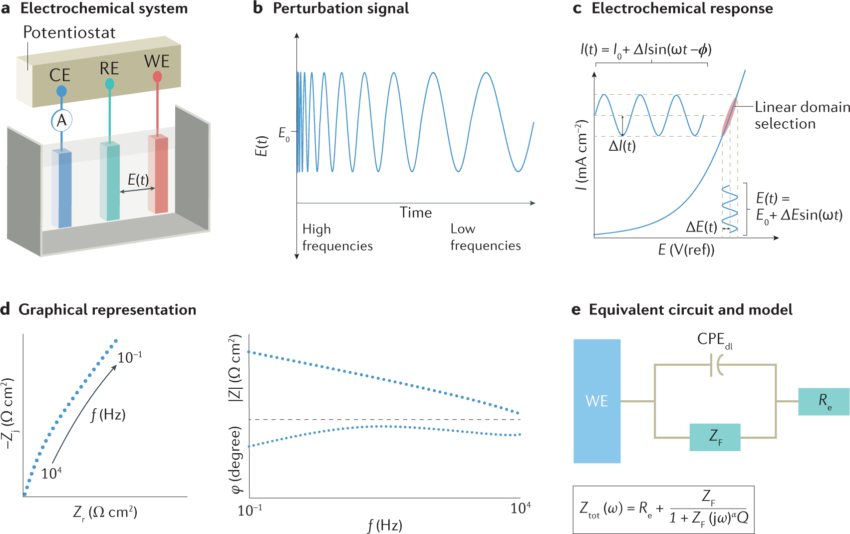Corrosion, the gradual degradation of materials due to chemical or electrochemical reactions with their environment, poses significant challenges across various industries. Understanding and mitigating corrosion are critical for maintaining the integrity and longevity of structures and components. Impedance spectroscopy has emerged as a powerful tool in corrosion studies, offering unique insights into the electrochemical processes involved. In this article, we explore the key role of impedance spectroscopy in advancing our understanding of corrosion mechanisms and facilitating effective corrosion prevention strategies.
Basics of Corrosion and Impedance Spectroscopy
Corrosion is a complex process influenced by factors such as material composition, environmental conditions, and the presence of corrosive agents. Impedance spectroscopy provides a detailed and non-destructive method to study corrosion by measuring the impedance response of a material to an applied AC signal across a range of frequencies.
Characterizing Corrosion Kinetics
Impedance spectroscopy allows researchers to investigate the kinetics of corrosion reactions. By analyzing the impedance data, information about charge transfer processes, corrosion rates, and reaction mechanisms can be extracted. This insight is crucial for predicting the long-term behavior of materials and understanding the factors influencing corrosion kinetics.
Monitoring Corrosion Products and Interfaces
As corrosion progresses, various products are formed at the metal-electrolyte interface. Impedance spectroscopy facilitates the characterization of these corrosion products and their impact on the overall corrosion process. The technique provides valuable information about the composition and properties of protective films or scales, aiding in the assessment of corrosion resistance.
Differentiating Corrosion Mechanisms
Corrosion can occur through different mechanisms, such as uniform corrosion, pitting corrosion, and crevice corrosion. Impedance spectroscopy helps differentiate between these mechanisms by providing distinct impedance signatures for each. This capability is essential for tailoring corrosion prevention strategies based on the specific corrosion mode affecting a material.
Evaluating Coating and Inhibitor Performance
Protective coatings and corrosion inhibitors are commonly employed to mitigate corrosion. Impedance spectroscopy serves as a powerful tool for evaluating the effectiveness of these corrosion protection methods. Researchers can assess the impedance response of coated or inhibited materials, gaining insights into the durability and performance of corrosion prevention strategies.
Field Monitoring and In-Situ Studies
Impedance spectroscopy is adaptable for in-situ corrosion monitoring, allowing researchers to study corrosion processes directly in the field. This real-time monitoring capability is valuable for assessing the impact of environmental changes, temperature variations, and other factors on the corrosion behavior of materials in their actual operating conditions.
Corrosion Modeling and Prediction
The impedance data obtained from experiments can be used to develop corrosion models, providing a quantitative understanding of the underlying processes. These models can aid in predicting the future corrosion behavior of materials, guiding maintenance schedules, and facilitating the design of corrosion-resistant materials and structures.
Corrosion Diagnosis and Early Detection
Impedance spectroscopy serves as a diagnostic tool for corrosion, enabling the early detection of corrosion-related issues. Changes in impedance spectra can indicate the onset of corrosion or the presence of localized corrosion phenomena, allowing for timely intervention and preventive measures to avoid extensive damage.
Integration into Corrosion Management Strategies
The insights gained from impedance spectroscopy are increasingly integrated into corrosion management strategies. From designing corrosion-resistant materials to optimizing protective coatings and inhibitors, impedance spectroscopy plays a central role in developing comprehensive and effective corrosion prevention and mitigation plans.
Conclusion
Impedance spectroscopy has revolutionized the field of corrosion studies by providing a nuanced and comprehensive approach to understanding corrosion mechanisms. Its applications extend from characterizing corrosion kinetics to evaluating protective coatings and inhibitors, enabling researchers and engineers to develop robust strategies for corrosion prevention. As industries continue to prioritize the durability and reliability of materials, impedance spectroscopy remains a key tool in the ongoing battle against the deleterious effects of corrosion.
